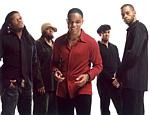
Steon Harris & Blackout
|
|
STEFON HARRIS & BLACKOUT
'62 Center For Theatre & Dance
Williams College, Williamstown, MA
April 22, 2006
by J Hunter
Everyone has potential; I truly believe that. But potential is nothing if it isn't realized, and that takes hard work, dedication, maturity, a willingness to listen, and an undying love for what you do. This package was on display when Stefon Harris & Blackout closed this year's Williamstown Jazz Festival.
Ten years ago, Harris - newly signed to Blue Note, with label chairman Bruce Lundvall in attendance - played the Skidmore Jazz Institute with an all-star band that included Greg Osby and Willie Jones III. The Albany native wore a suit that was so big, he looked like David Byrne in Stop Making Sense. The potential was there; everyone could hear it. But one question lingered: “Where will he go from here?”
The simple answer is: He went where growth curves live, and from what I could see, he hasn't stopped riding one.
Harris was ebullient as he led his quintet onto the main stage of Williams College's beautiful new '62 Center for Theatre & Dance. Wearing a black double-breasted suit (that fit) and an untucked white dress shirt with an open collar, Harris surveyed the vibraphone and the marimba arranged in a reverse L, said off-mike “I love comin' to work,” and kicked the band into “Blackout”. That tune eventually changed into “Gentle Wind”, though the ride was anything but gentle.
At the Skidmore show, there was the sense that Harris was doing (and playing) what other people told him to do, and the musicians behind him just playing a gig. Harris' current group is another kettle of fish; they are a take-no-prisoners outfit with resume points ranging from Betty Carter to DJ Logic. They are dedicated to knitting funk and jazz into one big monster, and they interact with Harris (and he with them) as equal partners in one kick-ass sound that is Harris' own.
With chemistry comes trust, and Harris revels in it. Just after he explained that everything is different every night with this band (“The music is gonna tell us where it wants to go…”), keyboardist Marc Cary started into “A Touch Of Grace”. Harris laughed, “I didn't pick this song, but we're gonna play it!”
There were moments like that throughout the night. At one point Harris, in need of a slower tempo, went into an exquisite rendition of Ellington's “A Single Petal Of A Rose”. He'd never played it with this band before, but Cary and bassist Derrick Hodge picked it up and ran with it; Hodge's bowing gave it a harmonic that was as mournful as it was beautiful. After the applause died down, Harris said offhandedly, “Somebody else start.” Without a thought, drummer Terreon Gully kicked off the next tune.
Hodge is the perfect bassman for this outfit, given his time in another group with a mercurial musical methodology, Terence Blanchard's Flow. Hodge and Gully laid it down every which way. Cary dredged up synth sounds right out of Miles' best electric days and paired them with solid straight-ahead jazz piano; Harris said it perfectly: “(Cary) is the only guy I know that can mix electric and acoustic sounds in an organic way.” The same could not be said for Casey Benjamin; while his alto sax had scorching fire and bottomless soul all evening, he relied too much on an effects box that made his contributions more annoying than adventuresome.
To watch Harris is to watch a martial artist, totally in the moment, motionless one second and then flying across both vibe sets the next. He did one arpeggio while standing on one foot, and I doubt he was even aware of it. The array of vibraphone and marimba gives Harris a world of textural options, and he used every one during the two-set performance. He also understands the power of the well-placed note, playing one note (or chord) where others would have launched a fusillade.
Like I said, it comes down to maturity. Harris is still very much a kid, as anyone can see from his youthful exuberance and playful nature. (“I must love you guys, 'cause I just killed this mallet. It's not supposed to have an Afro like that…”) But his music, and his ear, has come light years from that night at Skidmore. And the really cool thing is, Harris' journey is just getting started.
J HUNTER is a former announcer/producer for radio stations in the Capital Region and the Bay Area, including KSJS/San Jose (where he was Assistant Music Director/Jazz programming), Q104 WQBK/Albany, and WSSV/Saratoga. He has also written music and theatre reviews for the Glens Falls Chronicle. He currently resides in Clifton Park.
|

